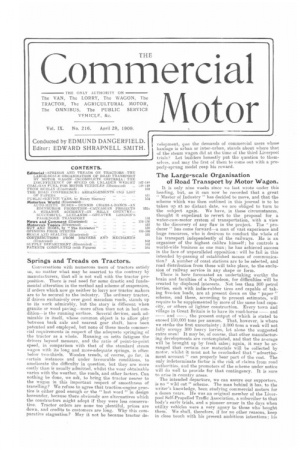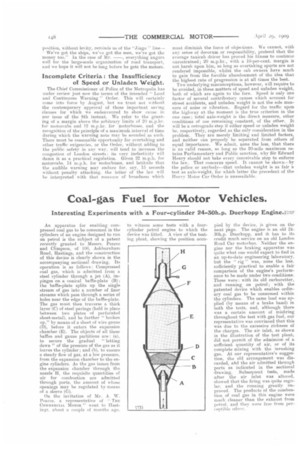The Large-scale Organisation of Road Transport by Motor Wagon.
Page 1

Page 2

If you've noticed an error in this article please click here to report it so we can fix it.
It is only nine weeks since we last wrote under this heading, but, as it can now be recorded that a great " Master of Industry" has decided to move, and that the scheme which was then outlined in this journal is to be taken up at no distant date, we are obliged to turn to the subject again. We have, in these circumstances, thought it expedient to revert to the proposal for a water-cum-motor system of transportation, with a view to the discovery of any flaw in the project. The " producer " has come forward—a man of vast experience and huge resources, who is desirous to conduct the whole of his transport independently of the railways. He is an organiser of the highest calibre himself ; he controls a world-wide business as one man ; he has achieved success in the face of unparalleled opposition: will he fail in this intended by-passing of established means of communication? A number of coast stations are to be selected, and road distribution from these will take place, to the exclusion of railway service in any shape or form.
There is here forecasted an undertaking worthy the brain and faculties of a Napoleon, for difficulties will be created by displaced interests. Not less than 300 petrol lorries, each with india-rubber tires and capable of taking five-ton loads, are at present down on the "paper " scheme, and these, according to present estimates, will require to he supplemented by more of the same load capacity, or others of lighter construction. Every town and village in Great Britain is to have its road-borne — and
and —, the present output of which is stated to exceed 150,000 tons per annum. That, however, is where we strike -the first uncertainty ; 3,000 tons a week will not fully occupy 300 heavy lorries, let alone the suggested extra ones! It may be, of course, that other manufacturing developments are contemplated, and that the average will be brought up by fresh sales; again, it may be arranged that certain raw materials will be collected by motor, whilst it must not be overlooked that " advertisement account " can properly hear part of the cost. The only indeterminate factor is the risk of claims from road authorities, and the promoters of the scheme under notice will do well to provide for that contingency. It is sure to arise in country areas.
The intended departure, we can assure our supporters, is no " wild cat " scheme. The man behind it has, to the writer's knowledge, been studying commercial motors for a dozen years. He was an original member of the Liverpool Self-Propelled Traffic Association, a subscriber to that body's early trials, and a pioneer owner in the days when utility vehicles were a very agony to those who bought them. We shall, therefore, if for no other reasons, keep in close touch with his present ambitious intentions; his position, without levity, reminds us of the "Jingo " line•• We've got the ships, we've got the men, we've got the money too," In the case of :Mr. —, everything augurs well for the large-scale organisation of road transport, and we hope it will not be long before he gets the motors.




















